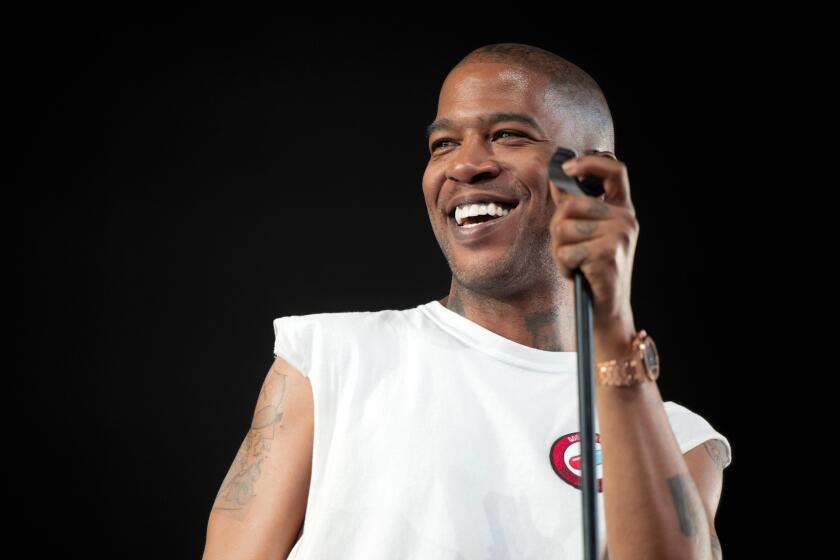News, views can confuse
NEW YORK -- For MSNBC, long the laggard of the cable news world, the early start to the 2008 presidential race meant the chance for another reinvention: fashioning itself as “the place for politics.”
Intense campaign coverage in the last year expanded the audience of the third-place cable news network, which has struggled for much of its 11 years to find a cohesive programming strategy. So far this year, 830,000 viewers on average have tuned in during weekday prime time -- 46% more than last year.
But the bigger spotlight on the network has also put a renewed focus on the outspoken nature of MSNBC’s hosts, who regularly slide between the roles of straight newscaster and voluble commentator.
Some of their remarks have drawn complaints from the presidential campaign of Democratic Sen. Hillary Rodham Clinton, which claims MSNBC has a pattern of hostile coverage toward her. After correspondent David Shuster said this month that Chelsea Clinton was being “pimped out” to lobby superdelegates, the campaign threatened to pull out of MSNBC’s debate tonight in Cleveland. Clinton agreed to participate after the network temporarily suspended Shuster for using “irresponsible” language.
As the 2008 race hurtles toward the general election, MSNBC’s role as a political lightning rod appears likely to persist. Even as they acknowledge the risks of a format that mixes news and opinion, network executives said they have no plans to rein in their hosts.
“Our people are not in straitjackets,” said Phil Griffin, NBC News’ senior vice president in charge of MSNBC. “They speak openly; they’re passionate. There’s a liveliness and richness to the conversation that you don’t see on CNN or Fox. Do we leave ourselves open a little more? Yeah. But I think it’s part of our success.”
Point of view is nothing new in cable news. But even in a landscape crowded with commentators, the MSNBC hosts stand out: Keith Olbermann excoriates the Bush administration during his show’s “Special Comment” segment and occasionally blogs on Daily Kos, a favorite website of the left. At an event celebrating his program’s 10th anniversary last fall, Chris Matthews declared that the current administration had “been caught in their criminality.”
The latter comment drew winces internally. But for the most part, MSNBC executives are at ease with the dual roles played by the network’s personalities. Both Olbermann and Matthews moderated campaign forums last year and anchor major news events.
“I do think that viewers accept that there are points of view out there, and sometimes that seeps out,” Griffin said. “As long as you’re up front and straight about what you’re doing, I’m OK.”
Still, he admits the dynamic is “a high-wire act,” underscored when Shuster, guest hosting on “Tucker,” made the “pimped out” remark. NBC News President Steve Capus personally called Hillary Clinton to apologize.
That followed an incident in January when Matthews said that the New York senator’s political success stemmed solely from public sympathy that “her husband messed around,” sparking protests by women’s groups.
Matthews later clarified his remarks, saying he did not mean that was the basis of her whole career. In an interview, he said he wanted to refine his comment but added that the Clinton campaign used the incident to score political points.
“They created the storm; I had to deal with it,” he said. “I think any observant person would say what I said was true. It might have been said better, more felicitously.”
Some media experts said MSNBC’s brew of news and opinion gives partisans fodder to argue bias.
“In an environment where opinions are flying, words escape easily,” said Mark Jurkowitz, associate director of the Project for Excellence in Journalism, a nonpartisan research group. “It gets harder and harder to define the line of what’s acceptable.”
Tom Fiedler, the visiting Murrow lecturer at Harvard University’s John F. Kennedy School of Government, rejected the idea “that you can move from one side to the other and not confuse most viewers. I don’t think even Fox would attempt to take Bill O’Reilly and put him in a position of being seen as a news anchor.”
Griffin acknowledged that MSNBC’s unrestrained culture concerns some NBC reporters who appear on the cable channel, but he said “people feel more comfortable with the crossover” than ever before.
The two networks now share space in Rockefeller Center, where MSNBC relocated last fall after closing its Secaucus, N.J., offices. NBC talent, including anchor Brian Williams, now appear on the cable channel even more frequently.
Williams, who is moderating tonight’s MSNBC debate, said he does not have qualms about giving reports on the opinion-saturated network.
“They know my limits; I don’t do opinions,” said the anchor. “But that doesn’t mean that a skilled broadcaster or journalist can’t inhabit both worlds at the same time.”
Still, some viewers have complained about the interplay in e-mails to Williams on his blog, the Daily Nightly.
“The cross-pollination of the NBC nightly news with MSNBC pundits like Chris Matthews and Keith Olbermann has made your election coverage far less palatable for me,” wrote a Virginia viewer.
Olbermann, a former ESPN sportscaster, said it is “nonsensical” that “either you are a color guy or a play-by-play guy.” But he admitted that the format presents some “real head-scratchers. . . . Some of it is subtle, like can I do a special comment on Monday and anchor primary coverage on Tuesday?”
Griffin tries to navigate those issues daily, reminding the staff: “I want analysis; I don’t want feelings.
“We can’t drop off. We’re creating an identity here, and it’s important we stay true to it.”
More to Read
The biggest entertainment stories
Get our big stories about Hollywood, film, television, music, arts, culture and more right in your inbox as soon as they publish.
You may occasionally receive promotional content from the Los Angeles Times.






